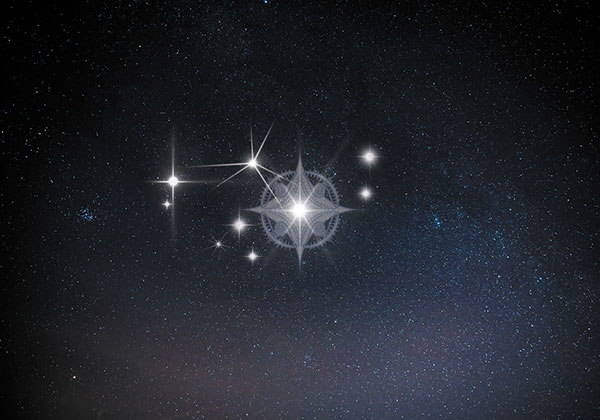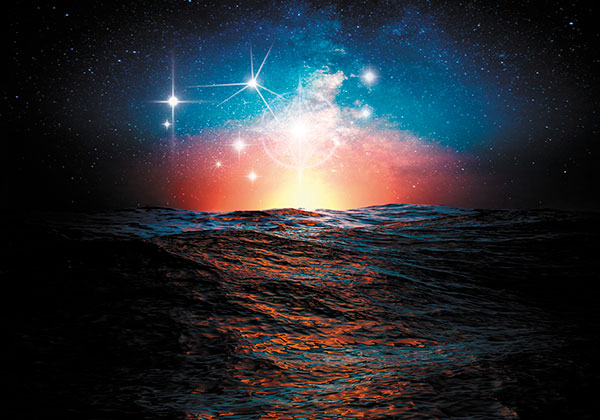The Origins of Matariki
Proudly presented by Te Wānanga o Aotearoa, join Dr Rangi Matamua as he shares his extensive knowledge around Matariki and Māori cosmology.
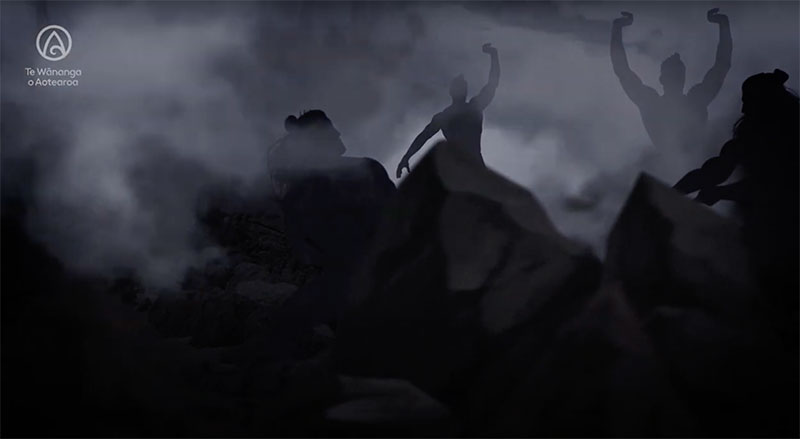
Proudly presented by Te Wānanga o Aotearoa, join Dr Rangi Matamua as he shares his extensive knowledge around Matariki and Māori cosmology.

Ranginui eloped with Papatūānuku, and together they became the primordial sky father and earth mother bearing over 70 children. Ranginui and Papatūānuku lay locked together in a tight embrace with their sons forced to live in the cramped darkness between them.
These children grew restless and discussed amongst themselves what it would be like to live in the light. All but one, Tāwhirimātea, agreed that they would separate their parents. The brothers put their plans into action—Rongo, the god of cultivated food, tried to push his parents apart, then Tangaroa, the god of the sea, and his sibling Haumia-tiketike, the god of wild food, joined him. Despite their joint efforts, Rangi and Papa remained close together in their loving embrace.
After many attempts, Tāne, god of forests and birds, forced his parents apart. Instead of standing upright and pushing with his hands as his brothers had done, he laid on his back and pushed with his strong legs, stretching Rangi and Papa apart. The connection was likened to sinew and bone, and as Tāne pushed them apart, these strands also had to be cut. Tāne pushed and pushed until, with cries of grief and surprise, Ranginui and Papatūānuku were pried apart.
Now with their parents apart, the tamariki of Ranginui and Papatūanuku saw light and had space to move for the first time. However, it wasn’t as great they expected. It was an expanse of dark and cold emptiness which quickly filled with a great flood of their parents’ tears. Amidst the rain, and from the darkness, lightning flashed. A figure of dread emerged – it was Tāwhirimātea, the god of storms and winds, angered that their parents had been torn apart.
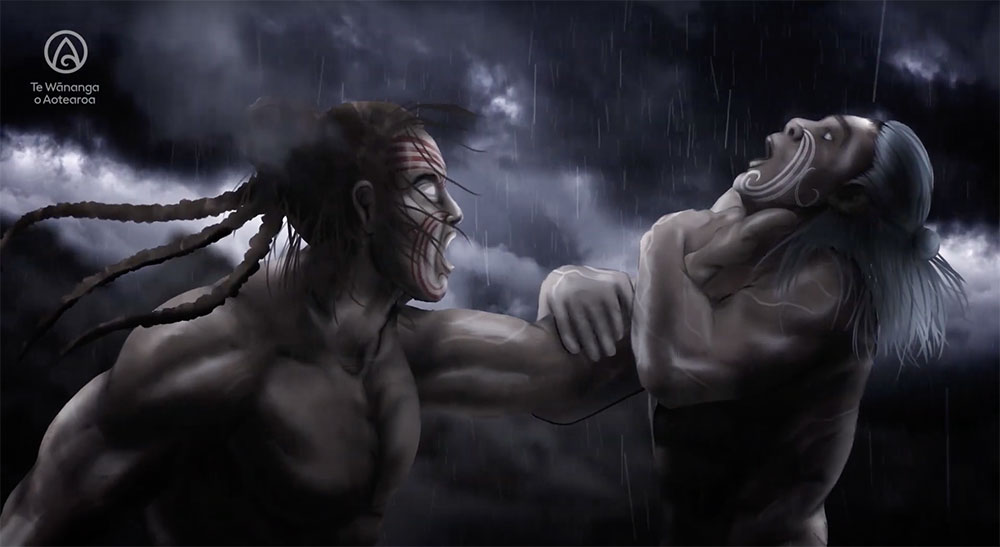
Tāwhirimātea couldn’t bear to hear the cries of his parents, nor see the tears of Ranginui as they were parted. He promised his siblings that henceforth they would have to deal with his vengeful anger. He flew off to join Rangi in the sky, and there carefully fostered his many offspring.
To fight his brothers, Tāwhirimātea gathered an army of his children —winds and clouds of different kinds, including fierce squalls, whirlwinds, thick gloomy clouds, fiery clouds, hurricane clouds and thunderstorm clouds, and rain, mists and fog. As these winds showed their might, the dust flew and the great forest trees of Tāne were smashed under the attack and fell to the ground, food for decay and for insects.
Then Tāwhirimātea attacked the oceans and huge waves rose, whirlpools formed, and Tangaroa, the god of the sea, fled in panic. One by one, Tāwhirimātea defeated his brothers to exact his revenge. Tāwhirimātea next attacked his brothers Rongo and Haumia-tiketike, the gods of cultivated and uncultivated foods. Rongo and Haumia were very afraid of Tāwhirimātea, but Papatūānuku decided to hide them so well that Tāwhirimātea could not find them.
Tāwhirimātea eventually turned on his brother Tūmatauenga, god of warfare and humanity, for an epic battle. He used all his strength, but Tūmatauenga stood fast. Tāwhirimatea could not prevail against him and was eventually defeated.
Tāhwirimātea, vowing to never let his brothers forget their betrayal of their parents, had one final act of defiance. Clawing out his eyes in anguish and grief, he crushed them in his hands and cast the shards into the heavens. He turned to Tūmātauenga and declared he would have his vengeance, attacking his children with chaos and destruction forever. Tāwhirimātea’s storms and hurricanes attack humankind to this day.
Whenever we look up to the skies, Ngā Mata o te Ariki Tāwhirimātea, or “Matariki” as we now know it, can be seen looking down at us as a reminder.
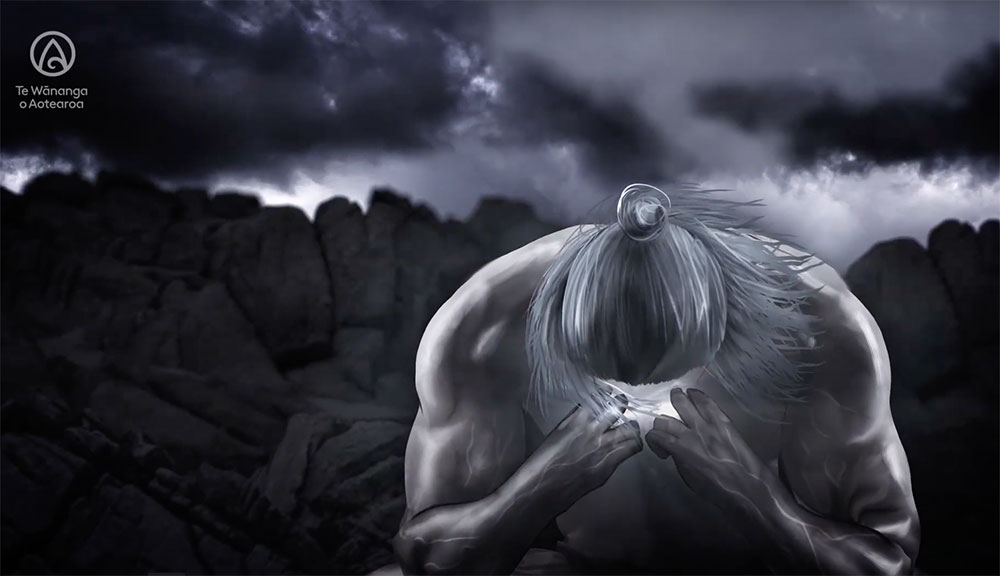
Proudly presented by Te Wānanga o Aotearoa, join Dr Rangi Matamua as he shares his extensive knowledge around the name Matariki.
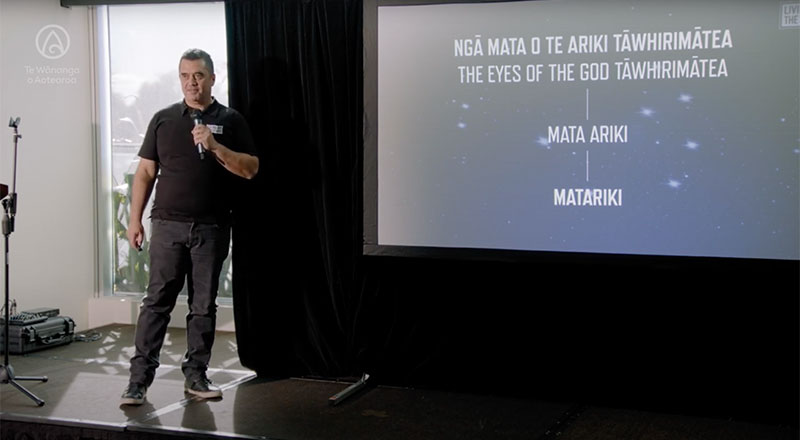
We understand Matariki to be a truncated version of the long name ‘Ngā Mata o te Ariki Tawhirimātea,’ which translated means ‘the eyes of the god Tawhirimātea.’ This name comes from the origin story of the star cluster, which occurred soon after the separation of Ranginui and Papatuānuku.
Matariki is often translated as ‘little eyes.’ This translation appears to have come from the famous ethnographer Elsdon Best, and subsequent authors have continued to support this name meaning. However, besides Best’s rough translating of ‘Mata riki’ being small points or small eyes, no greater meaning has been found. His literal translation of ‘Matariki’ lacks a greater connection to Māori understandings of cosmology.
